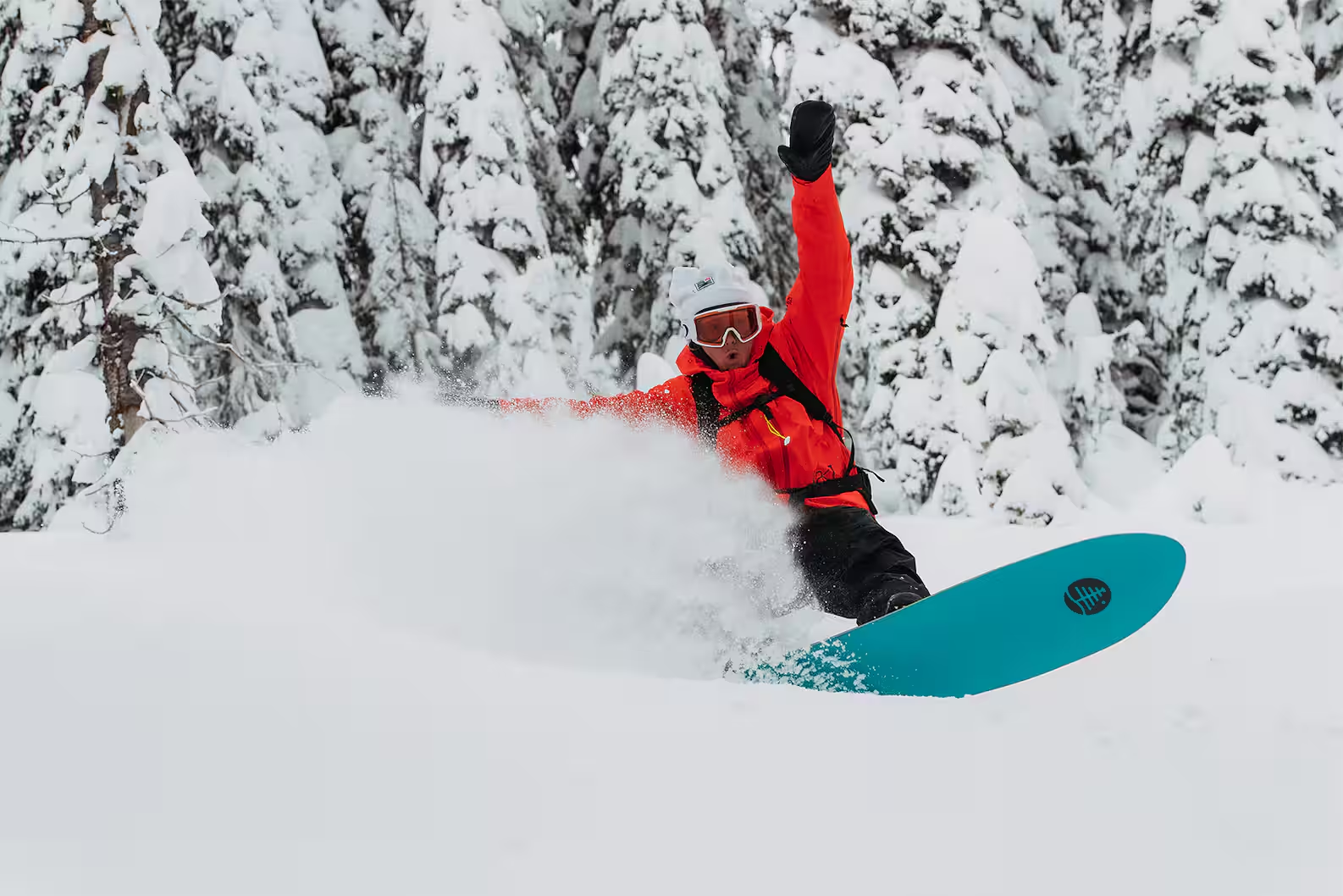Powder Surfing 101:
Powder surfing (or pow surfing) is the sport of riding a bindingless board downhill on snow without the use of bindings or a handle. Powder surfing allows riders to “surf” the snow and provides a feeling that closely resembles leaning into a wave in the ocean, or a deep powder turn on a snowboard (even in shallow snow in the backyard). Because of its connections to other boardsports, pow surfing is often extremely easy to pick up for snowboarders, surfers, skateboarders, and wakeboarders alike. So, whether you enrolled in this class just to learn a bit more about pow surfing or you’re looking for some specific info on getting started, here's a quick guide with all the basics.
Spoiler: You’re going to start surfing pow. And you’ll love it.
- History of Pow Surfing
- Pow Surfing Gear
- Types of Pow Surfing Boards
- Where to go Pow Surfing
- Pow Surfing Basics
A Brief History of Powder Surfing
Of course, any discussion on the history of pow surfing must begin with snurfing. Snurfing remains an original inspiration for snowboarding, and early Burton prototypes (like the Burton Backyard BBII in 1978) were based on snurfer shapes. But as snowboard materials advanced in the 1980s and binding technology improved, strapping in became the primary method of riding sideways.
For the next few decades, many manufacturers (such as Winterstick) experimented with bindingless boards. And then in the 2009, Burton began producing the No Fish powder surfing board.
Today, pow surfing boards are available in a variety of shapes, sizes, and materials from leading snowboard manufacturers like Burton and boutique producers alike. In fact, there is an ideal pow surfing board for every type of terrain, riding style, and snow.
Powder Surfing Gear
One of the appeals of pow surfing is that there is very little specialty gear required to get started. Basically, you really only need a board. However, we generally suggest a few additional items to increase the safety level and ensure maximum fun.
- Board: Select a board or make your own with the Burton DIY Throwback Snowboard. Obviously, this is the most important component of the entire experience so make sure to choose a board that meets your needs based on your riding style and the terrain you plan to ride.
- Leash: Prevent runaway equipment. There are no bindings keeping you connected to the board so make sure to properly leash up. Wipe out without a leash and the best case is you have to walk the rest of the way down the hill and the worst case is that your board rides off into the great beyond to never be seen again.
- Boots: Any pair of reliable winter boots will work for pow surfing, but a looser boot allows maximum ankle mobility. Consider a flat-footed boot with no raised heel and a stiffness that feels good to you.
- Proper Layers: Remember that you’ll spend a lot of time walking around before dropping in so it’s important to manage body temperature. The right base layers will breathe and wick sweat while you hike and then insulate to keep you warm on the way down.
- Outerwear: Being cold and wet is the quickest way to ruin an afternoon outdoors. A warm jacket, snow pants, mittens/gloves, and goggles are key to staying comfortable in winter temperatures.
- Helmet: Burton always recommends wearing a helmet when getting on a board—whether you strap in or not. Invest in a properly fitting helmet and get in the habit of wearing it.
Note: Pow surfing purists commonly agree that a pow surfing board is intended to be ridden without the assistance of a handle. It’s an important distinction, but for the sake of this discussion we believe that learning to pow surf with a handle is a good way for beginners to ease into the sport.
Types of Pow Surfing Boards
There are essentially two main types of powder surfing boards: solid and foam. Each type is specifically engineered and constructed using different materials, but both are fundamentally used to ride the same terrain.
Solid
Solid pow surfing boards are constructed in the same manner as traditional snowboards, with wood cores and metal edges. Solid powder surfing boards are essentially shortened snowboards and will flex and ride in a similar fashion; this is the most common type pow surfing board to find on the mountain, with lots of custom homebrew variations. The Burton Backseat Driver and Burton Throwback are two of the most popular solid pow surfing boards currently available.
Featured Blogs
- Blogg
- Pow Surfer
- deployed the changes to staging
- Testing web blog publication
- blog checking
- test blog not creation issue in sub agents
- Here test
- fine
- Cluck Norris
- testing duplicate blog publisher issue
- schedule later (Copy)
- schedule later
- Reproduce duplicate posting issue
- Testing long running worker
- testing rails upgrade
- testing web blog changes (Copy)
- testing with force unlock
- testing web blog changes
- teting
- Bass of the week
- web blog 2
- Test from web blog publisher
- testing with both queue
- enqueued against blog queue
- Testing web blog publisher with new queue
- testing blog approval
- testing from admin web blog publisher
- Test
- Bass of the Week: 13 Custom Instruments Alex 4
- testing with only active users
- testing without expired users
- testing with expired users
- Testing Web Blog
- This is a blog post
